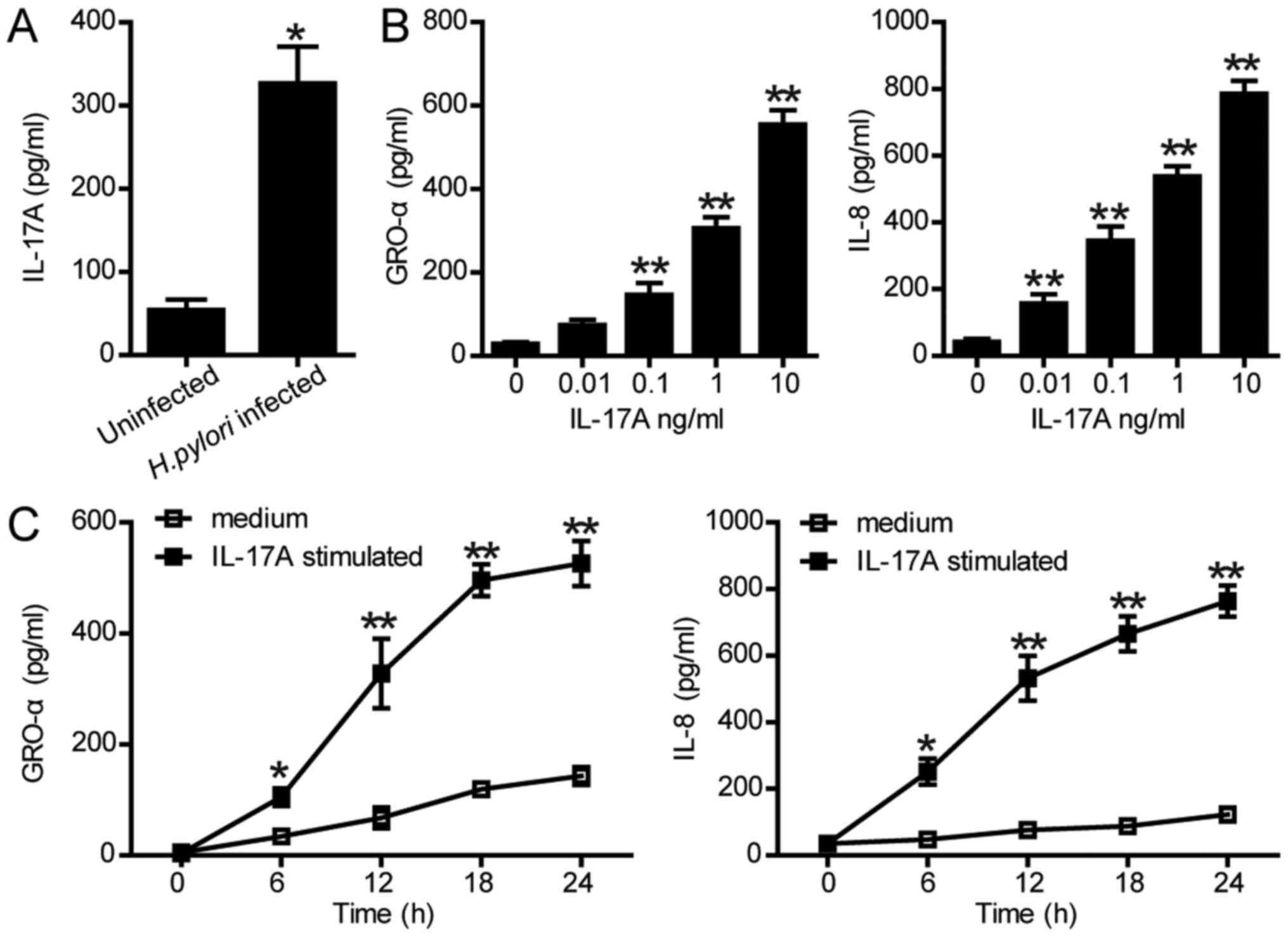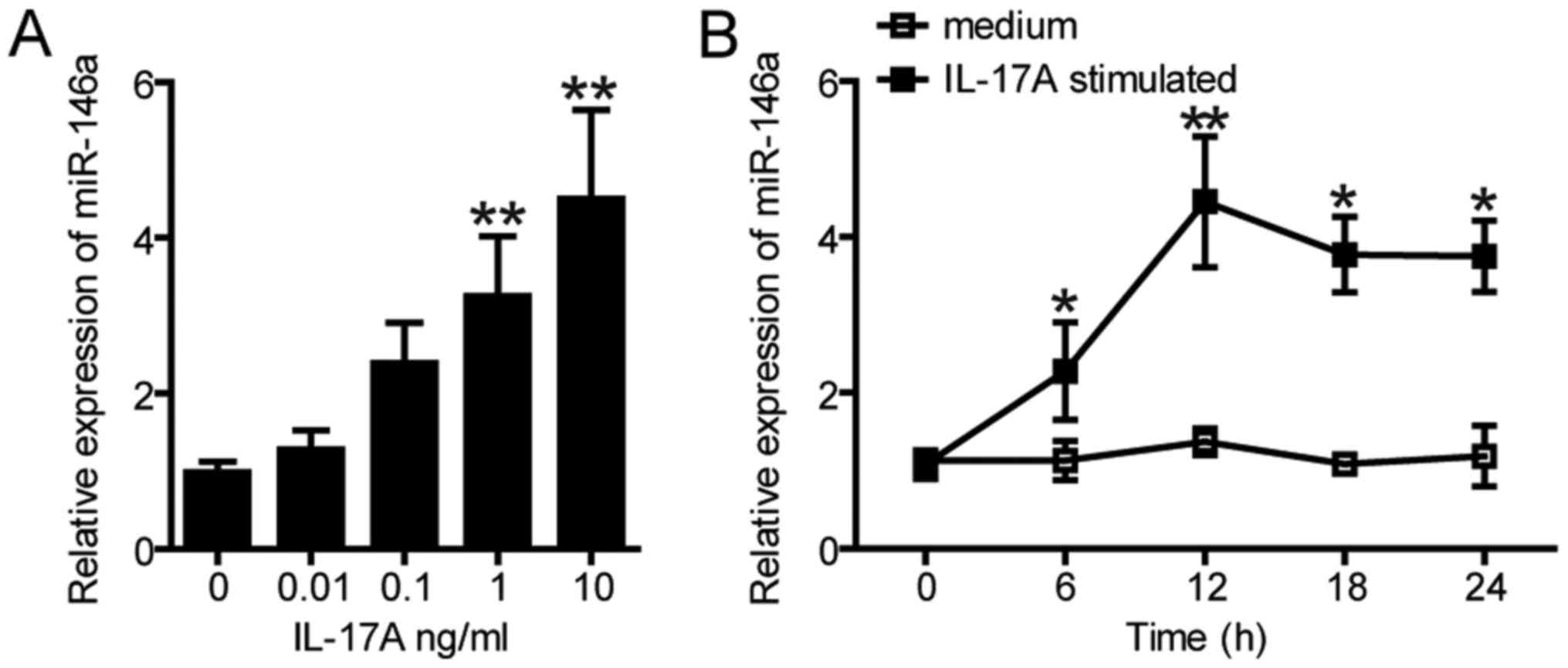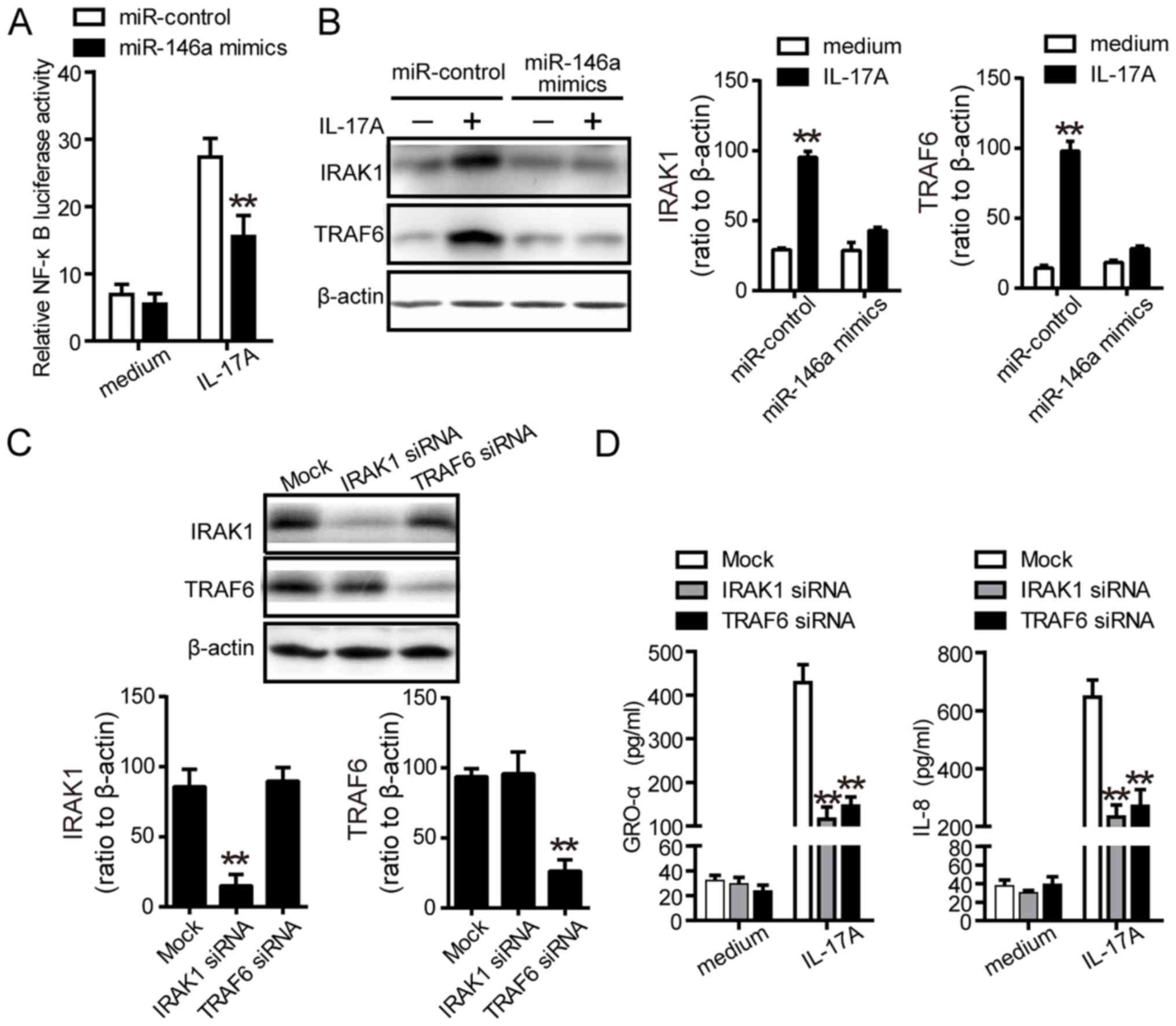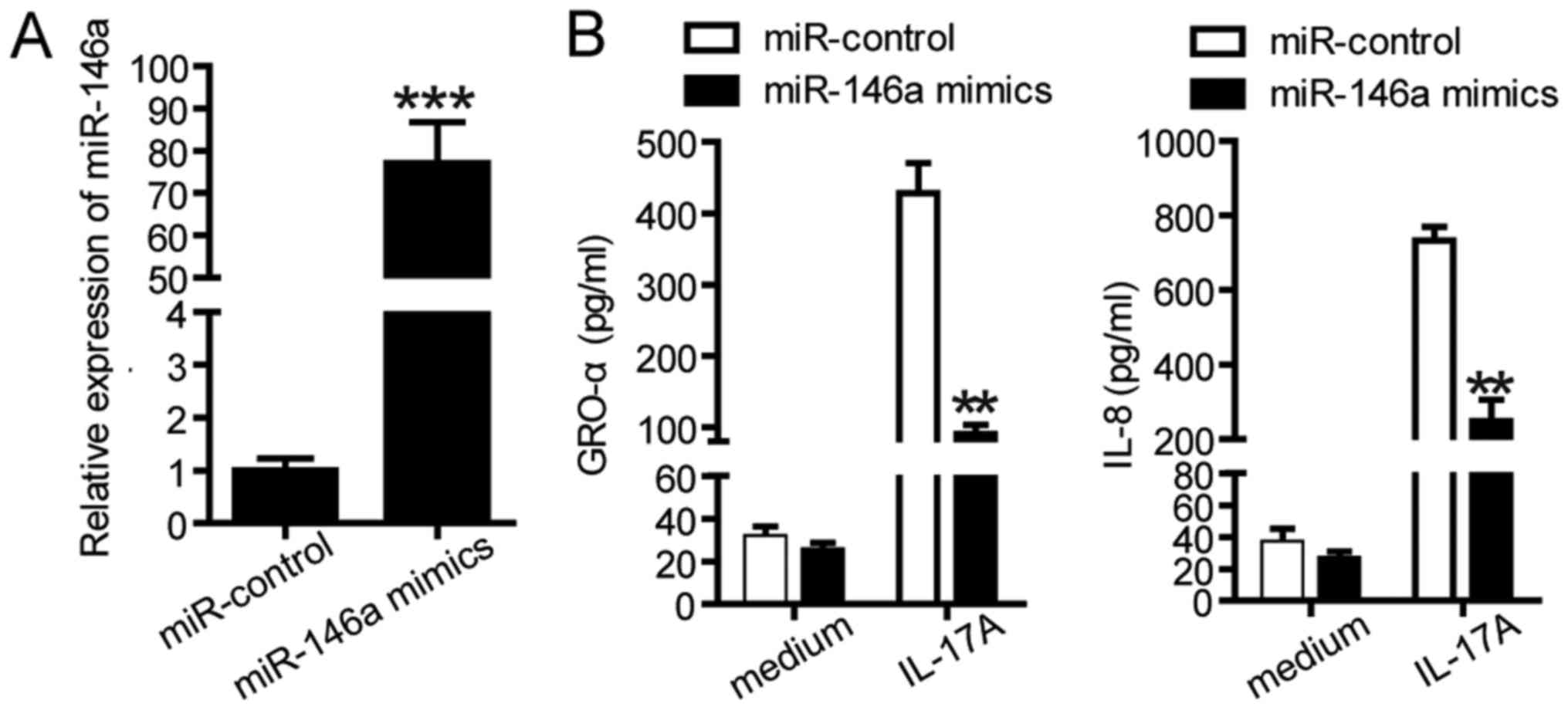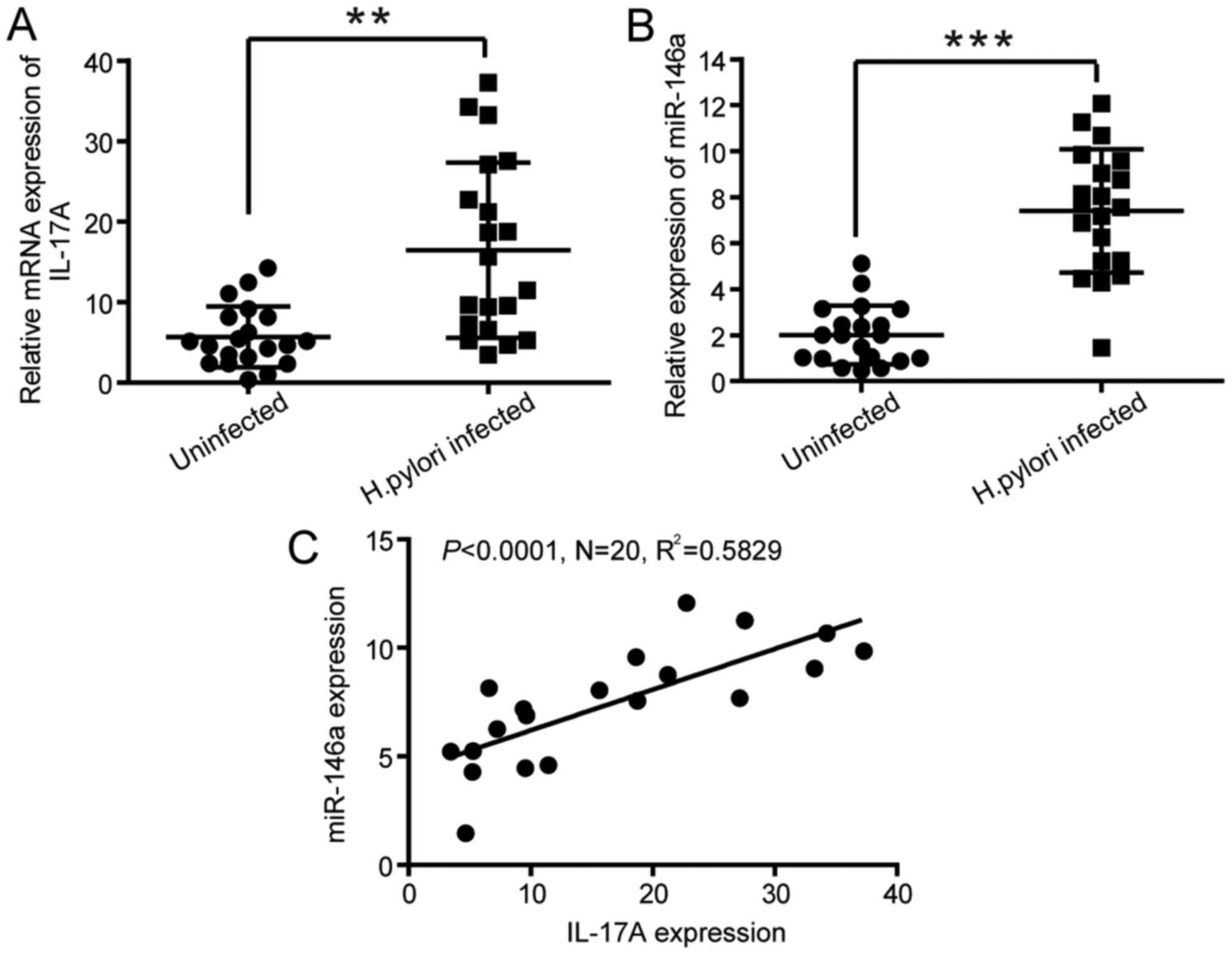|
1
|
Marshall BJ and Warren JR: Unidentified
curved bacilli in the stomach of patients with gastritis and peptic
ulceration. Lancet. 1:1311–1315. 1984. View Article : Google Scholar : PubMed/NCBI
|
|
2
|
Atherton JC and Blaser MJ: Coadaptation of
Helicobacter pylori and humans: Ancient history, modern
implications. J Clin Invest. 119:2475–2487. 2009. View Article : Google Scholar : PubMed/NCBI
|
|
3
|
Komiyama Y, Nakae S, Matsuki T, Nambu A,
Ishigame H, Kakuta S, Sudo K and Iwakura Y: IL-17 plays an
important role in the development of experimental autoimmune
encephalomyelitis. J Immunol. 177:566–573. 2006. View Article : Google Scholar : PubMed/NCBI
|
|
4
|
Simonian PL, Roark CL, Wehrmann F, Lanham
AM, Born WK, O'Brien RL and Fontenot AP: IL-17A-expressing T cells
are essential for bacterial clearance in a murine model of
hypersensitivity pneumonitis. J Immunol. 182:6540–6549. 2009.
View Article : Google Scholar : PubMed/NCBI
|
|
5
|
Troncone E, Marafini I, Pallone F and
Monteleone G: Th17 cytokines in inflammatory bowel diseases:
Discerning the good from the bad. Int Rev Immunol. 32:526–533.
2013. View Article : Google Scholar : PubMed/NCBI
|
|
6
|
Nakae S, Nambu A, Sudo K and Iwakura Y:
Suppression of immune induction of collagen-induced arthritis in
IL-17-deficient mice. J Immunol. 171:6173–6177. 2003. View Article : Google Scholar : PubMed/NCBI
|
|
7
|
Khmaladze I, Kelkka T, Guerard S, Wing K,
Pizzolla A, Saxena A, Lundqvist K, Holmdahl M, Nandakumar KS and
Holmdahl R: Mannan induces ROS-regulated, IL-17A-dependent
psoriasis arthritis-like disease in mice. Proc Natl Acad Sci USA.
111:E3669–E3678. 2014. View Article : Google Scholar : PubMed/NCBI
|
|
8
|
Cua DJ and Tato CM: Innate IL-17-producing
cells: The sentinels of the immune system. Nat Rev Immunol.
10:479–489. 2010. View
Article : Google Scholar : PubMed/NCBI
|
|
9
|
Cheung PF, Wong CK and Lam CW: Molecular
mechanisms of cytokine and chemokine release from eosinophils
activated by IL-17A, IL-17F, and IL-23: Implication for Th17
lymphocytes-mediated allergic inflammation. J Immunol.
180:5625–5635. 2008. View Article : Google Scholar : PubMed/NCBI
|
|
10
|
Luzza F, Parrello T, Monteleone G, Sebkova
L, Romano M, Zarrilli R, Imeneo M and Pallone F: Up-regulation of
IL-17 is associated with bioactive IL-8 expression in
Helicobacter pylori-infected human gastric mucosa. J
Immunol. 165:5332–5337. 2000. View Article : Google Scholar : PubMed/NCBI
|
|
11
|
Mizuno T, Ando T, Nobata K, Tsuzuki T,
Maeda O, Watanabe O, Minami M, Ina K, Kusugami K, Peek RM and Goto
H: Interleukin-17 levels in Helicobacter pylori-infected
gastric mucosa and pathologic sequelae of colonization. World J
Gastroenterol. 11:6305–6311. 2005. View Article : Google Scholar : PubMed/NCBI
|
|
12
|
Sebkova L, Pellicanò A, Monteleone G,
Grazioli B, Guarnieri G, Imeneo M, Pallone F and Luzza F:
Extracellular signal-regulated protein kinase mediates interleukin
17 (IL-17)-induced IL-8 secretion in Helicobacter
pylori-infected human gastric epithelial cells. Infect Immun.
72:5019–5026. 2004. View Article : Google Scholar : PubMed/NCBI
|
|
13
|
Du C, Liu C, Kang J, Zhao G, Ye Z, Huang
S, Li Z, Wu Z and Pei G: MicroRNA miR-326 regulates TH-17
differentiation and is associated with the pathogenesis of multiple
sclerosis. Nat Immunol. 10:1252–1259. 2009. View Article : Google Scholar : PubMed/NCBI
|
|
14
|
Lu LF, Boldin MP, Chaudhry A, Lin LL,
Taganov KD, Hanada T, Yoshimura A, Baltimore D and Rudensky AY:
Function of miR-146a in controlling Treg cell-mediated regulation
of Th1 responses. Cell. 142:914–929. 2010. View Article : Google Scholar : PubMed/NCBI
|
|
15
|
Stittrich AB, Haftmann C, Sgouroudis E,
Kühl AA, Hegazy AN, Panse I, Riedel R, Flossdorf M, Dong J,
Fuhrmann F, et al: The microRNA miR-182 is induced by IL-2 and
promotes clonal expansion of activated helper T lymphocytes. Nat
Immunol. 11:1057–1062. 2010. View Article : Google Scholar : PubMed/NCBI
|
|
16
|
Chan EK, Ceribelli A and Satoh M:
MicroRNA-146a in autoimmunity and innate immune responses. Ann
Rheum Dis. 72 Suppl 2:ii90–ii95. 2013. View Article : Google Scholar : PubMed/NCBI
|
|
17
|
Taganov KD, Boldin MP, Chang KJ and
Baltimore D: NF-kappaB-dependent induction of microRNA miR-146, an
inhibitor targeted to signaling proteins of innate immune
responses. Proc Natl Acad Sci USA. 103:12481–12486. 2006.
View Article : Google Scholar : PubMed/NCBI
|
|
18
|
Zhao JL, Rao DS, Boldin MP, Taganov KD,
O'Connell RM and Baltimore D: NF-kappaB dysregulation in
microRNA-146a-deficient mice drives the development of myeloid
malignancies. Proc Natl Acad Sci USA. 108:9184–9189. 2011.
View Article : Google Scholar : PubMed/NCBI
|
|
19
|
Nahid MA, Satoh M and Chan EK: Interleukin
1β-responsive MicroRNA-146a is critical for the cytokine-induced
tolerance and cross-tolerance to toll-like receptor ligands. J
Innate Immun. 7:428–440. 2015. View Article : Google Scholar : PubMed/NCBI
|
|
20
|
Li N, Xu X, Xiao B, Zhu ED, Li BS, Liu Z,
Tang B, Zou QM, Liang HP and Mao XH: H. pylori related
proinflammatory cytokines contribute to the induction of miR-146a
in human gastric epithelial cells. Mol Biol Rep. 39:4655–4661.
2012. View Article : Google Scholar : PubMed/NCBI
|
|
21
|
Xiao B, Zhu ED, Li N, Lu DS, Li W, Li BS,
Zhao YL, Mao XH, Guo G, Yu PW and Zou QM: Increased miR-146a in
gastric cancer directly targets SMAD4 and is involved in modulating
cell proliferation and apoptosis. Oncol Rep. 27:559–566.
2012.PubMed/NCBI
|
|
22
|
Liu Z, Wang D, Hu Y, Zhou G, Zhu C, Yu Q,
Chi Y, Cao Y, Jia C and Zou Q: MicroRNA-146a negatively regulates
PTGS2 expression induced by Helicobacter pylori in human
gastric epithelial cells. J Gastroenterol. 48:86–92. 2013.
View Article : Google Scholar : PubMed/NCBI
|
|
23
|
Bhaumik D, Scott GK, Schokrpur S, Patil
CK, Campisi J and Benz CC: Expression of microRNA-146 suppresses
NF-kappaB activity with reduction of metastatic potential in breast
cancer cells. Oncogene. 27:5643–5647. 2008. View Article : Google Scholar : PubMed/NCBI
|
|
24
|
Nahid MA, Pauley KM, Satoh M and Chan EK:
miR-146a is critical for endotoxin-induced tolerance: IMPLICATION
IN INNATE IMMUNITY. J Biol Chem. 284:34590–34599. 2009. View Article : Google Scholar : PubMed/NCBI
|
|
25
|
Kim DJ, Park KS, Kim JH, Yang SH, Yoon JY,
Han BG, Kim HS, Lee SJ, Jang JY, Kim KH, et al: Helicobacter
pylori proinflammatory protein up-regulates NF-kappaB as a
cell-translocating Ser/Thr kinase. Proc Natl Acad Sci USA.
107:21418–21423. 2010. View Article : Google Scholar : PubMed/NCBI
|
|
26
|
Hou J, Wang P, Lin L, Liu X, Ma F, An H,
Wang Z and Cao X: MicroRNA-146a feedback inhibits RIG-I-dependent
Type I IFN production in macrophages by targeting TRAF6, IRAK1, and
IRAK2. J Immunol. 183:2150–2158. 2009. View Article : Google Scholar : PubMed/NCBI
|
|
27
|
Livak KJ and Schmittgen TD: Analysis of
relative gene expression data using real-time quantitative PCR and
the 2(-Delta Delta C(T)) method. Methods. 25:402–408. 2001.
View Article : Google Scholar : PubMed/NCBI
|
|
28
|
Tang B, Li N, Gu J, Zhuang Y, Li Q, Wang
HG, Fang Y, Yu B, Zhang JY, Xie QH, et al: Compromised autophagy by
MIR30B benefits the intracellular survival of Helicobacter
pylori. Autophagy. 8:1045–1057. 2012. View Article : Google Scholar : PubMed/NCBI
|
|
29
|
Kimang'a A, Revathi G, Kariuki S, Sayed S,
Devani S, Vivienne M, Kuester D, Mönkemüller K, Malfertheiner P and
Wex T: IL-17A and IL-17F gene expression is strongly induced in the
mucosa of H. pylori-infected subjects from Kenya and Germany. Scand
J Immunol. 72:522–528. 2010. View Article : Google Scholar : PubMed/NCBI
|
|
30
|
Liu Z, Xiao B, Tang B, Li B, Li N, Zhu E,
Guo G, Gu J, Zhuang Y, Liu X, et al: Up-regulated microRNA-146a
negatively modulate Helicobacter pylori-induced inflammatory
response in human gastric epithelial cells. Microbes Infect.
12:854–863. 2010. View Article : Google Scholar : PubMed/NCBI
|
|
31
|
Chen J, Liao MY, Gao XL, Zhong Q, Tang TT,
Yu X, Liao YH and Cheng X: IL-17A induces pro-inflammatory
cytokines production in macrophages via MAPKinases, NF-κB and AP-1.
Cell Physiol Biochem. 32:1265–1274. 2013. View Article : Google Scholar : PubMed/NCBI
|
|
32
|
Ernst PB and Gold BD: The disease spectrum
of Helicobacter pylori: The immunopathogenesis of
gastroduodenal ulcer and gastric cancer. Annu Rev Microbiol.
54:615–640. 2000. View Article : Google Scholar : PubMed/NCBI
|
|
33
|
Caruso R, Fina D, Paoluzi OA, Del Vecchio
Blanco G, Stolfi C, Rizzo A, Caprioli F, Sarra M, Andrei F, Fantini
MC, et al: IL-23-mediated regulation of IL-17 production in
Helicobacter pylori-infected gastric mucosa. Eur J Immunol.
38:470–478. 2008. View Article : Google Scholar : PubMed/NCBI
|
|
34
|
Numasaki M, Watanabe M, Suzuki T,
Takahashi H, Nakamura A, McAllister F, Hishinuma T, Goto J, Lotze
MT, Kolls JK and Sasaki H: IL-17 enhances the net angiogenic
activity and in vivo growth of human non-small cell lung cancer in
SCID mice through promoting CXCR-2-dependent angiogenesis. J
Immunol. 175:6177–6189. 2005. View Article : Google Scholar : PubMed/NCBI
|
|
35
|
Vykhovanets EV, Maclennan GT, Vykhovanets
OV and Gupta S: IL-17 Expression by macrophages is associated with
proliferative inflammatory atrophy lesions in prostate cancer
patients. Int J Clin Exp Pathol. 4:552–565. 2011.PubMed/NCBI
|
|
36
|
Shiomi S, Toriie A, Imamura S, Konishi H,
Mitsufuji S, Iwakura Y, Yamaoka Y, Ota H, Yamamoto T, Imanishi J
and Kita M: IL-17 is involved in Helicobacter pylori-induced
gastric inflammatory responses in a mouse model. Helicobacter.
13:518–524. 2008. View Article : Google Scholar : PubMed/NCBI
|
|
37
|
Krebs CF, Kapffer S, Paust HJ, Schmidt T,
Bennstein SB, Peters A, Stege G, Brix SR, Meyer-Schwesinger C,
Müller RU, et al: MicroRNA-155 drives TH17 immune response and
tissue injury in experimental crescentic GN. J Am Soc Nephrol.
24:1955–1965. 2013. View Article : Google Scholar : PubMed/NCBI
|
|
38
|
He C, Shi Y, Wu R, Sun M, Fang L, Wu W,
Liu C, Tang M, Li Z, Wang P, et al: miR-301a promotes intestinal
mucosal inflammation through induction of IL-17A and TNF-α in IBD.
Gut. 65:1938–1950. 2016. View Article : Google Scholar : PubMed/NCBI
|
|
39
|
Niimoto T, Nakasa T, Ishikawa M, Okuhara
A, Izumi B, Deie M, Suzuki O, Adachi N and Ochi M: MicroRNA-146a
expresses in interleukin-17 producing T cells in rheumatoid
arthritis patients. BMC Musculoskelet Disord. 11:2092010.
View Article : Google Scholar : PubMed/NCBI
|
|
40
|
Liu X, He F, Pang R, Zhao D, Qiu W, Shan
K, Zhang J, Lu Y, Li Y and Wang Y: Interleukin-17 (IL-17)-induced
microRNA 873 (miR-873) contributes to the pathogenesis of
experimental autoimmune encephalomyelitis by targeting A20
ubiquitin-editing enzyme. J Biol Chem. 289:28971–28986. 2014.
View Article : Google Scholar : PubMed/NCBI
|
|
41
|
Doreau A, Belot A, Bastid J, Riche B,
Trescol-Biemont MC, Ranchin B, Fabien N, Cochat P, Pouteil-Noble C,
Trolliet P, et al: Interleukin 17 acts in synergy with B
cell-activating factor to influence B cell biology and the
pathophysiology of systemic lupus erythematosus. Nat Immunol.
10:778–785. 2009. View Article : Google Scholar : PubMed/NCBI
|
|
42
|
Shalom-Barak T, Quach J and Lotz M:
Interleukin-17-induced gene expression in articular chondrocytes is
associated with activation of mitogen-activated protein kinases and
NF-kappaB. J Biol Chem. 273:27467–27473. 1998. View Article : Google Scholar : PubMed/NCBI
|
|
43
|
Ruland J: Return to homeostasis:
Downregulation of NF-κB responses. Nat Immunol. 12:709–714. 2011.
View Article : Google Scholar : PubMed/NCBI
|
|
44
|
Selvamani SP, Mishra R and Singh SK:
Chikungunya virus exploits miR-146a to regulate NF-κB pathway in
human synovial fibroblasts. PLoS One. 9:e1036242014. View Article : Google Scholar : PubMed/NCBI
|
|
45
|
He X, Zheng Y, Liu S, Shi S, Liu Y, He Y,
Zhang C and Zhou X: MiR-146a protects small intestine against
ischemia/reperfusion injury by down-regulating TLR4/TRAF6/NF-κB
pathway. J Cell Physiol. 233:2476–2488. 2018. View Article : Google Scholar : PubMed/NCBI
|
|
46
|
Sundaravinayagam D, Kim HR, Wu T, Kim HH,
Lee HS, Jun S, Cha JH, Kee Y, You HJ and Lee JH: miR146a-mediated
targeting of FANCM during inflammation compromises genome
integrity. Oncotarget. 7:45976–45994. 2016. View Article : Google Scholar : PubMed/NCBI
|















